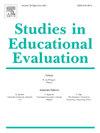How school leadership and innovation shape instructional pathways to student achievement across nations: Evidence from multilevel structural equation modeling and decision tree analysis
IF 2.6
2区 教育学
Q1 EDUCATION & EDUCATIONAL RESEARCH
引用次数: 0
Abstract
Educational leadership, innovation and teaching play essential roles in shaping student achievement. However, extant literature primarily has relied on linear modelling approaches and has not focused on substantively testing a theory. The present study employs multilevel structural equation modelling (ML-SEM) and multilevel decision trees (MLM trees) to investigate associations between school leadership, team innovation, cognitive activation and student achievement using PISA-TALIS 2018 linked data across seven countries: Australia; Colombia; Czech Republic; Denmark; Georgia; Malta; and Türkiye. The ML-SEM findings indicated no significant indirect effects from leadership on achievement. The MLM trees highlighted country-specific patterns in associations between school leadership, innovation and student achievement, revealing potential nonlinear relationships. These findings suggest that the relationship between leadership, instructional practices and achievement is highly context-dependent. The study contributes to the literature by offering a comparative analysis of ML-SEM and MLM trees, highlighting traditional linear models’ limitations in educational research.
学校领导和创新如何塑造各国学生成就的教学途径:来自多层次结构方程模型和决策树分析的证据
教育领导、创新和教学在塑造学生成就方面发挥着至关重要的作用。然而,现有文献主要依赖于线性建模方法,并没有着重于对理论进行实质性的测试。本研究采用多层次结构方程模型(ML-SEM)和多层次决策树(MLM树),利用七个国家的PISA-TALIS 2018相关数据,调查学校领导、团队创新、认知激活和学生成绩之间的关系:哥伦比亚;捷克共和国;丹麦;乔治亚州;马耳他;和Turkiye。ML-SEM的研究结果表明,领导对成就没有显著的间接影响。传销树在学校领导、创新和学生成绩之间的关联中突出了国家特定模式,揭示了潜在的非线性关系。这些发现表明,领导力、教学实践和成就之间的关系高度依赖于情境。该研究通过对ML-SEM和MLM树进行比较分析,突出了传统线性模型在教育研究中的局限性,从而为文献做出了贡献。
本文章由计算机程序翻译,如有差异,请以英文原文为准。
求助全文
约1分钟内获得全文
求助全文
来源期刊

Studies in Educational Evaluation
Multiple-
CiteScore
6.90
自引率
6.50%
发文量
90
审稿时长
62 days
期刊介绍:
Studies in Educational Evaluation publishes original reports of evaluation studies. Four types of articles are published by the journal: (a) Empirical evaluation studies representing evaluation practice in educational systems around the world; (b) Theoretical reflections and empirical studies related to issues involved in the evaluation of educational programs, educational institutions, educational personnel and student assessment; (c) Articles summarizing the state-of-the-art concerning specific topics in evaluation in general or in a particular country or group of countries; (d) Book reviews and brief abstracts of evaluation studies.
 求助内容:
求助内容: 应助结果提醒方式:
应助结果提醒方式:


